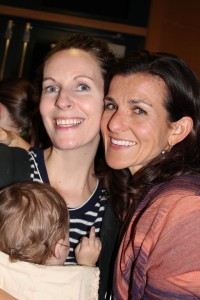
“Sisters, why do we ask? Why do we ask if we are worthy? Why do we ask if we are expendable? Why do we seek approval? Why do we ask for protection? It has not come. It may never come. I wish it were otherwise. I believe we deserve better. I believe God wants better for us. But the asking orients our movement in particular ways that our own history shows to be of dubious benefit to women’s leadership and autonomy. Let us remember the profound lesson of Linda King Newell’s essay “A Gift Given, A Gift Taken Away”: it was when Mormon women started asking, seeking approval from Church hierarchy to give blessings of healing and before childbirth, that’s when the power was lost. We will not find equality by waiting for approval from headquarters. We must find our leadership within ourselves, in our relationship to God, and in taking responsibility for meeting the needs of our people.
I think of Lowell Bennion’s favorite saying, from the Bhagavad Gita, “To action alone thou has a right, not to its fruits.” The fruits of our feminist labors must not be measured in terms of our ability to move a few powerful men in the Church Office Building, or gather information about them, or work our privileged connections to them, or make them in anyway the object of our focus. They have their work to do; let us do ours. Let us turn instead to our sisters, our mothers, our daughters—worldwide, of every color. What are the issues that connect Mormon women across class and continent? Where are we vulnerable? Where are lives precarious? What are our needs? There is leadership to be claimed in naming and organizing around those needs and identifying and criticizing the exclusionary power structures that have created them. That independence of vision, that resilience in the face of what will surely be continuing cycles of retrenchment, that must be our charge for the next forty years. That is prophetic leadership. With or without approval. With or without ordination.”
Joanna Brooks, Exponent II Retreat, 2014
Why do we ask? We do it all the time. We ask to hold our babies during their blessings. We ask to teach a lesson about Christ (instead of the Book of Mormon witnesses) on Easter Sunday. We ask to meet with the Bishop, and then we ask again to implement changes on the ward level to make women more visible. We ask for food orders. We ask for funds. We ask for power, and we ask for authority.
There have been times when we haven’t asked – we’ve just done. Women have made changes in this church simply by their actions. In 1894, George Q. Cannon (then 1st counselor in the First Presidency) warned that women who practice “the devilish arts” of birth control “will be cursed in their bodies, cursed in their minds, cursed in their property, cursed in their offspring. God will wipe them out from the midst of this people and this nation.”[1] The prophet Joseph F. Smith reaffirmed this in 1908, saying birth control “destroys the morals of the community and the nation”[2], and apostle John A. Widtsoe cautioned that using birth control “roots in a species of selfishness,” even arguing that women who use it would become more masculine in thought and action.[3] In a response to the release of the birth control pill, the First Presidency issued a statement to Bishops and Stake Presidents in April 1969 which contained phrases such as “it is contrary to the teachings of the Church artificially to curtail the birth of children” and “those who practice birth control will reap disappointment by and by.” Ezra Taft Benson, then an apostle, warned that same month in General Conference that “The world teaches birth control. Tragically, many of our sisters subscribe to its pills and practices when they could easily provide earthly tabernacles for more of Father’s children. There are couples who think they are getting along just fine with their limited families but who will someday suffer the pains of remorse when they meet the spirits that might have been part of their posterity.”[4] Even as recently as 1993, Elder Dallin H. Oaks quoted President Spencer W. Kimball in General Conference, saying, “It is an act of extreme selfishness for a married couple to refuse to have children when they are able to do so. How many children should a couple have? All they can care for! Exercising faith in God’s promises to bless them when they are keeping his commandments, many LDS parents have large families.”[5] It wasn’t until the church handbook of instructions was revised in 1998 that “the decision as to how many children to have and when to have them is extremely intimate and private and should be left between the couple and the Lord” and that “church members should not judge one another in this matter.”
And yet, in a study conducted in Fall 1976, 83% of LDS households surveyed reported using birth control, despite the heavy pronouncements against it from church authorities. And interestingly enough, this appears to be virtually unchanged in 2004, when the BYU Health Center reported that at least 80% of the women who come in for pre-marital exams request some form of contraception.
To me, this is a powerful example of women simply claiming their rights and doing. Church leaders weren’t given influence over the very personal decisions of family planning and bodily autonomy – we simply refused to cede power over what was rightfully ours, and acted accordingly. Over time, church leaders either recognized the error of previous pronouncements or recognized their inability to control these decisions on a church-wide basis, and put the responsibility squarely back on the shoulders of individuals. I sometimes worry that, like the views on birth control, it will take many decades for the church to make substantive changes when it comes to women’s roles in the institutional church. Many women are already voting with their feet. How can we vote with our hands?
Why do we ask? How can we heed Joanna Brooks’ words and “turn instead to our sisters, our mothers, our daughters” going forward? What things can we claim (and reclaim) as being rightfully ours? How do we look to each other, identify our needs and our vulnerabilities, and do our work? How can we heed the words in D&C 58:27-28, that “[wo]men should be anxiously engaged in a good cause, and do many things of their own free will, and bring to pass much righteousness; For the power is in them, wherein they are agents unto themselves”?
And what things must we continue to ask? If we believe in priesthood authority coming from God, how do we claim it, both formally and informally? If we want to equalize the current binary of men being the “listeners” and women being “listened to,” then how do we do that?
***
[1] George Q. Cannon, Deseret Weekly, 1 Oct. 1894, 49: 739; reprinted in Gospel Truth, (Salt Lake City: Deseret Book, 1987), 379.
[2] Joseph F. Smith, Improvement Era 11 (October 1908): 959-61.
[3] John A. Widstoe, “Should Birth Control be Practiced?” Improvement Era (December 1942).
[4] Ezra Taft Benson, Conference Report (April 1969).
[5] Dallin H. Oaks, “The Great Plan of Happiness,” Ensign (November 1993): 75.


